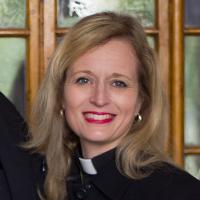Several weeks ago, Rolf Jacobson wrote helpfully about the re-imagination of Lent; rather than employing the tired language of a “Lenten Journey,” Jacobson calls upon leaders to strive for a “thick Lenten experience,” working backward, employing “reverse design,” using as a starting point: “What would you like to have happen in Lent to the individual and communal lives of Christians?”
I couldn’t agree more heartily.
And yet, Lent and Easter for the past two years have been all about journey in my life, and the expectation of sharing what I have learned through this journey.
It was in the middle of Lent 2012 that my family arrived in Jerusalem, disheveled and out-of-place. With wide eyes, we encountered the Palm Sunday parade snaking its way down the Mount of Olives, replete with thousands of believers from all over the world waving their branches and singing in their native tongues; we gathered with Arabic and German brothers and sisters to once again taste the wine and eat the bread on Maundy Thursday; we followed the Via Dolorosa on a dark Good Friday before the break of dawn, taking turns in carrying a life-size cross; we awoke early on Easter morning, before the sun, to gather on a mountain top and reclaim “Alleluia.”
Sounds breathtaking, life-changing, faith-enriching. And it was. It was a privilege, and will be, again this year.
But the Holy Week glory is only one small part of the journey, and it is far from the most important portion.
This gut wrenching Lenten/Easter/Pentecost/Ordinary Time/Advent/Christmas/Epiphany/Transfiguration/Lent-Again trip is not a palm-waving, hymn-singing journey alongside the pilgrims making their way here, into the heart of the home of Jesus, only to board a plane and fly back to their busy lives.
This is a Lenten journey that doesn’t end in forty days, but goes on and on and on and on. This is the unending story of the descendants of Jesus, who keep on keeping on when those of us who have kept the Lenten fast are long gone.
The Christians here comprise less than 2% of the population.
Many of them live their lives under military occupation, traveling to and from their daily jobs through armed checkpoints. Recently, we had the honor of bringing a Lutheran Christian friend from her home in the tiny town of Beit Jala to an engagement party about twenty miles away. As we drove through Jerusalem to get to the celebration, she leaned forward from the backseat and exclaimed, “It has been twenty years! Twenty years since I have been to Jerusalem. It is not legal for me to be here; I am a Palestinian resident of the West Bank.” When I had sufficiently recovered from the realization that I was driving an “illegal” passenger in my car, I paused to think: How long until she returns? We fly in and out, oblivious; she waits and waits.
Do you want to take your congregation on a journey this year? Do you want a “thick experience” that will change your life and theirs?
Start to learn and tell the stories of the Christians who live and struggle today where Jesus took his final journey to the cross. Lay aside, for a moment, the holy sites and the nostalgia associated with romantic pilgrimages. Step away from the beautiful ancient stones that tell the tales of a life lived for the redemption of God’s people.
Turn, instead, to the living stones, the very ones whom Christ came to save, those who suffered and suffer still. While we plan our soup suppers and sacrifice chocolate (or Facebook), they cry out for us to look and see, to listen and tell, to believe and act.
Take a different kind of journey, into the very heart of God. You don’t have to get on an airplane. You don’t have to travel far. But wait: you do have to pay. It will cost you dearly; you have to pay attention. You have to pay all of your attention. Where can you start, practically speaking? Google, of course: “Holy Land Christians.”
Type in other words: Lutheran, Episcopalian. See what you find, where the cyberspace journey leads.
Rolf Jacobson is correct. We need to abandon tired metaphors and meaningless practices. We need to re-imagine the idea of a “journey” – or let it go altogether. We need to re-invent our observation of Lent.
But why stop there with the re-invention? Dream on, working preachers — look more deeply, see more clearly, love more boldly. You are the ones who tell God’s story of making all things new – and that includes the old, old story.
Blessings on the journey — or the un-journey — of Lent.

